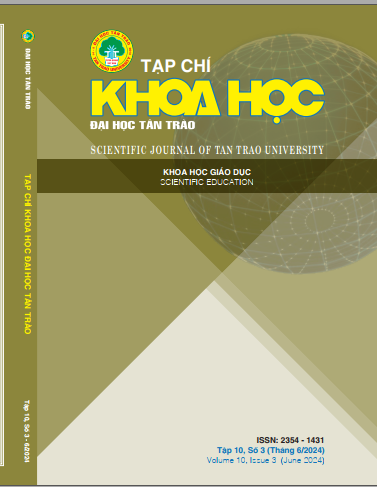SELF-ASESSMENT OF THE FRESHMEN’S PARTICIPATION IN DISCUSSION OF ENGLISH-SPEAKING SKILLS TRAINING AT HANOI UNIVERSITY OF BUSINESS AND TECHNOLOGY
DOI:
https://doi.org/10.51453/2354-1431/2024/1069Keywords:
Self-assessment, motivational participation, English competency, effectiveness, language environmentsAbstract
Of all the four skills, speaking is one of the skills which is very important to be mastered by most language learners. This descriptive quantitative study was conducted with 69 representative first-year non-English major students at Hanoi University of Business and Technology during the second term of the 2022-2023 academic years. The results revealed that most of the participants had a low level of English which deterred them from active participation in English-speaking lessons. Moreover, despite finding it challenging to take part in discussion activities, they still wanted teachers to give them more chances to participate in. The findings would be served as resourceful references to whom concerned
Downloads
References
Bakar, N. I. A., Noordin, N., & Razali, A. B (2019). Improving oral communicative competence in English using project-based learning activities. English Language Teaching, 12(4), 73-84. https://doi.org/10.5539/elt.v12n4p73
Brown, H. D (2014). Principles of language learning and teaching (6th ed.). Pearson Education. p. 178.
Cronbach, L. J (1951). Coefficient alpha and the internal structure of tests. Psychometrika, 16, 297–334. https://doi.org/10.1007/BF02310555
` Dornyei, Z., & Taguchi, T. (2010). Questionnaires in Second Language Research: Construction, Administration and Processing (2nd ed.). New York: Routledge.
Dushi, G (2012) What are the advantages of discussion method of teaching, from https://www.preservearticles.com/education/what-are-theadvantages-of-discussion-method-of-teaching/18114
Ekmekçi, E (2016). Comparison of native and non-native English language teachers’ evaluation of EFL learners’ speaking skills: Conflicting or identical rating behaviour?
English Language Teaching, 9(5), 98 - 105. http://dx.doi.org/10.5539/elt.v9n5p98
Gomari, H. & Marshall D.(2017). From native-like selections to English academic performance: Exploring the knowledge base of English bilinguals. Iranian Journal of Language Teaching Research, 5(3), 129-150. https://doi.org/10.30466/IJLTR.2017.20308
Harmer, J (2007). How to Teach English: An Introduction to the Practice of English Language Teaching (2nd edition), Addison Wesley Longman Limited.
Hirst, N (2016). Using Pecha Kucha as formative assessment in two undergraduate modules. (Re)conceptualising "The right lines". Practitioner Research in Higher Education, 10(1), 140-155. https://ojs.cumbria.ac.uk/index.php/prhe/article/view/316
La, T. H (2011). Using discussion activities to increase motivation and speaking proficiency of second-year EFL students at Hanoi University of Business and Technology: An action research study, MA Thesis, Hanoi: ULIS, VNU.
Mengo, S (2016). The effect of discussion technique and English learning motivation toward students’ speaking ability. Jurnal Pendidikan Dan Kebudayaan Missio, 8(1), 112-119. https://doi.org/10.36928/jpkm.v8i1.93
Nejad, A. M., & Mahfoodh, O. H. A. (2019). Assessment of Oral Presentations: Effectiveness of Self-, Peer-, and Teacher Assessments. International Journal of Instruction, 12(3), 615-632. https://doi.org/10.29333/iji.2019.12337a
Nguyen, T. H (2012), The use of role-play activities in improving speaking skills for the first year English major students at Hanoi University of Industry, MA Thesis, Hanoi: ULIS, VNU.
Ur, P (2012). A Course in English Language Teaching (2nd ed.). Cambridge: Cambridge University Press. https://doi.org/10.1017/9781009024518.
Downloads
Published
How to Cite
Issue
Section
License

This work is licensed under a Creative Commons Attribution-ShareAlike 4.0 International License.
All articles published in SJTTU are licensed under a Creative Commons Attribution-ShareAlike 4.0 International (CC BY-SA) license. This means anyone is free to copy, transform, or redistribute articles for any lawful purpose in any medium, provided they give appropriate attribution to the original author(s) and SJTTU, link to the license, indicate if changes were made, and redistribute any derivative work under the same license.
Copyright on articles is retained by the respective author(s), without restrictions. A non-exclusive license is granted to SJTTU to publish the article and identify itself as its original publisher, along with the commercial right to include the article in a hardcopy issue for sale to libraries and individuals.
Although the conditions of the CC BY-SA license don't apply to authors (as the copyright holder of your article, you have no restrictions on your rights), by submitting to SJTTU, authors recognize the rights of readers, and must grant any third party the right to use their article to the extent provided by the license.


